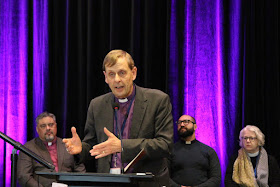Nearly time for the annual blog holiday (hope to resume on Monday 16 January 2023) so one last post in 2022 to ruminate a little on a things Anglican and otherwise. A pot pouri not an essay.
Different perspectives within the same history
Having posted recently about differing perspectives in the gospel birth-infancy narratives, it has been an interesting Christmas for me and my family. We've had a very pleasant Christmas, with lots of good family time, amazing food, and, in an inclement summer, some gorgeous weather on Christmas Day itself. That's one perspective. In another perspective, particularly if I was of a gloomy cast of mind, I could focus on a telling in which I emphasised that the run up to Christmas was more stressful than usual, one family member had to isolate because of Covid, another has been in hospital, and nearly every day I have thought about a swim at the beach, the weather has been unsuitably cold ... and thus make our Christmas narrative sound very dark and depressing! Life is a mixture, a series of complications, of challenges and inspirations, of difficulties to overcome which are also opportunities to demonstrate love and compassion.
Why are fundamentalist followers of religions so mean and nasty (at least on Twitter)?
My rumination here builds on a foundation of seeing numerous instances on Twitter where, say, on "Catholic Twitter", a Catholic tweets something favourable about the Pope [let me repeat, the Pope, who is, after all, Catholic) and then the thread of comments following is a pile on against the tweeter and/or the Pope, lamenting the reality of Vatican 2, bewailing papal persecution of [ultra] conservative Catholics, alleging this heresy and that apostasy (of current Catholic leaders). And so on.
Protestant Twitter is equally problematic. Just the other day popular singer Amy Grant announced that she was hosting her niece's same-sex wedding on her ranch. A pile on of tweets and comments ensued. Mostly along the lines of "She's no longer a Christian." No less a figure than Franklin Graham publicly bewailed her iniquity.
Intriguingly, around Christmas Day, I saw a tweet by a senior Islamic figure in the UK, wishing the church leaders such as ++Welby and Cardinal Nichols a happy Christmas. The pile on of comments to this pleasant tweet came straight from the (ultra) conservative Catholic and/or Protestant playbook!! How could this man not know that the Qu'ran specifically forbade wishing the infidel greetings on their festivals etc.
Commonly, across such threads of bile, is a fundamentalism of the form, "Since our sacred text(s) say ABC, your proposing DEF is wrong and thus you (and/or the person you defend) are apostate/unfaithful/infidel."
This approach to defending the faith is just mean and nasty.
The greater difficulty is that in a world tired of religion and its tropes, the God behind such adherence to fundamentals comes across as a being not particularly kind or cheerful enought to spend eternity with!
How resilient is Anglicanism?
There is an argument that the genius of Anglicanism lies in its ability to accommodate. An outbreak of evangelical revival? No problem. A series of tracts which gain traction towards a retrieval of things Catholic from before the English Reformation: there is room in the inn! A bishop exploring the edges of theological sanity with wonderings as to the physical nature of the resurrection? Let's see where this goes (while keeping fingers crossed that just one or two bishops will be so minded as to publicly share their musings). We're good, in other words, at finding ways to keep people in, rather than drive them out. (Yes, I know what you know, that there have been exceptions to this rule, notably our failure to accommodate Wesleyanism.)
Another way of thinking about what it means to accommodate differences within the Anglican house is that we have an ability (with limits) to adapt what we do to flow with needs of the hour, changes in local communities, and developments in socialization (i.e. the ways we prefer to gather as social beings). Thus, in this parish, an 8 am service is different to a 10 am service is different to a 4 pm Messy Church on a Saturday, and many difference groups within the parish are catered for re tastes in styles of worship. Or, in that parish, a penchant for social justice activism or for charismatic prayer and praise or for silent contemplation is catered for by adapting current small groups meeting on weekday nights. Then, beyond the territorial confines of parish boundaries, the bishop permits gatherings variously styled as "Fresh Expression" or "Pioneer church" or Something Catchy, meeting in a pub or a library or a surf club, as possible ways and means of connecting the gospel with people unlikely to ever cross the threshold of a classic church building.
It is not difficult, surveying Anglicanism around the globe, to see that a lot of accommodation of adaptation is going on (as well as corollaries, such as intense debate in the CofE about "the future of the parish"). In a time of ebbing numbers for Western Anglican churches, we simply have to try new things in a fast changing set of societies united by a rapidly evolving culture.
I suggest this is Anglicanism also showing another characteristic: resilience.
The way 2023 is shaping up (e.g. numbers at classic or traditional Sunday worship services generally lower after the ravages of Covid lockdowns) we will need to be resilient as never we have had to be for a long time before.
Looking back on Lambeth 2022
That was a really good time!
Happy New Year for 2023 :)


